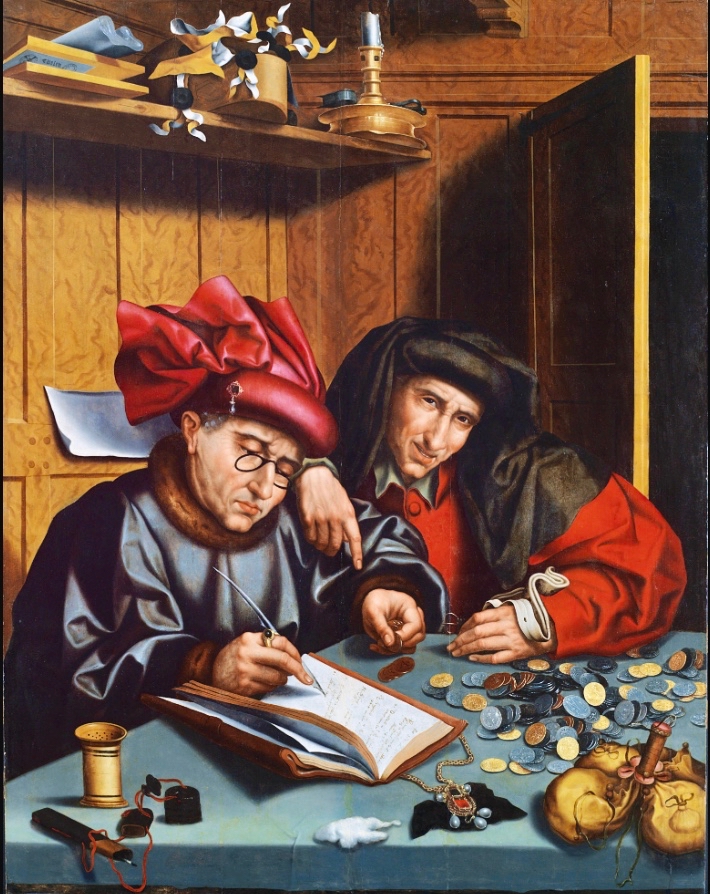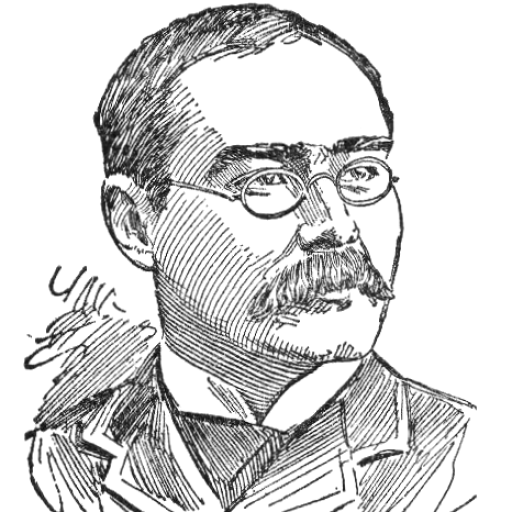And none may thrive without his fellows’ grace …

Dives (pronounced Die-vees) of the New Testament is the rich money-changer (in our language, banker) who because of his avarice on earth is frying in hell-fire without hope of salvation, while his poor but God-fearing neighbor Lazarus lies “in the bosom of Abraham”.
Kipling, as often, takes the contrarian view: in God’s great scheme of things there is a place for the capitalist vices of avarice, selfishness and rapacity too. The forceful message of the poem is that world peace will not be achieved by men having more empathy and consideration for their fellow human beings – man’s nature is not likely to change. Rather, peace can be achieved by integration of the economic systems so that it is in everybody’s self-interest to cooperate. In Dives’ cynical formulation –
“… and the Earth a market-place / Where the anxious traders know / Each is surety for his foe / And none may thrive without his fellows’ grace.”
This was certainly the premise for the founding of the European Iron and Steel Community after the Second World War that led to the creation of the European Union (indeed, there has never been a war between twp EU members). Although experience shows us that countries may also act against their own self-evident economic interests, as in the case of Brexit.
The poem is purposefully replete with Biblical references and uses the obsolete “thee” form, to show that there is nothing new under the sun – these principles of human behavior were just as valid in Biblical times as they are today.
The Peace of Dives
The Word came down to Dives in Torment where he lay: (1) "Our World is full of wickedness, My Children maim and slay, "And the Saint and Seer and Prophet "Can make no better of it "Than to sanctify and prophesy and pray. "Rise up, rise up, thou Dives, and take again thy gold, "And thy women and thy housen as they were to thee of old. (2) "It may be grace hath found thee "In the furnace where We bound thee, "And that thou shalt bring the peace My Son foretold." Then merrily rose Dives and leaped from out his fire, And walked abroad with diligence to do the Lord's desire; And anon the battles ceased, And the captives were released, And Earth had rest from Goshen to Gadire. The Word came down to Satan that raged and roared alone, 'Mid the shouting of the peoples by the cannon overthrown (3) (But the Prophets, Saints and Seers Set each other by the ears, For each would claim the marvel as his own): "Rise up, rise up, thou Satan, upon the Earth to go, "And prove the Peace of Dives if it be good or no: "For all that he hath planned "We deliver to thy hand, "As thy skill shall serve, to break it or bring low." (4) Then mightily rose Satan, and about the Earth he hied, And breathed on Kings in idleness and Princes drunk with pride. But for all the wrong he breathed There was never sword unsheathed, And the fires he lighted flickered out and died. Then terribly rose Satan, and darkened Earth afar, Till he came on cunning Dives where the money-changers are; And he saw men pledge their gear For the gold that buys the spear, And the helmet and the habergeon of war. (5) Yea, to Dives came the Persian and the Syrian and the Mede And their hearts were nothing altered, nor their cunning nor their greed And they pledged their flocks and farms For the King-compelling arms, And Dives lent according to their need. Then Satan said to Dives: - "Return again with me, "Who hast broken His Commandment in the day He set thee free, "Who grindest for thy greed "Man's belly-pinch and need, "And the blood of Man to filthy usury!" Then softly answered Dives where the money-changers sit: - "My Refuge is Our Master, O My Master in the Pit. "But behold all Earth is laid "In the Peace which I have made, "And behold I wait on thee to trouble it!" Then angrily turned Satan, and about the Seas he fled, To shake the new-sown peoples with insult, doubt, and dread; But, for all the sleight he used, There was never squadron loosed, And the brands he flung flew dying and fell dead. But to Dives came Atlantis and the Captains of the West - And their hates were nothing weakened nor their angers nor unrest - And they pawned their utmost trade For the dry, decreeing blade; And Dives lent and took of them their best. Then Satan said to Dives: - "Declare thou by The Name, "The secret of thy subtlety that turneth mine to shame. "It is known through all the Hells "How my peoples mocked my spells, "And my faithless Kings denied me ere I came." Then answered cunning Dives: "Do not gold and hate abide "At the heart of every Magic, yea, and senseless fear beside? "With gold and fear and hate "I have harnessed state to state, "And by hate and fear and gold their hates are tied. "For hate men seek a weapon, for fear they seek a shield - "Keener blades and broader targes than their frantic neighbours wield (6) "For gold I arm their hands, "And for gold I buy their lands, "And for gold I sell their enemies the yield. "Their nearest foes may purchase, or their furthest friends may lease, "One by one from Ancient Accad to the Islands of the Seas. "And their covenants they make "For the naked iron's sake, "But I - I trap them armoured into peace. "The flocks that Egypt pledged me to Assyria I drave, "And Pharaoh hath the increase of the herds that Sargon gave. (7) "Not for Ashdod overthrown "Will the Kings destroy their own, "Or their peoples wake the strife they feign to brave. "Is not Carchemish like Calno? For the steeds of their desire (8) "They have sold me seven harvests that I sell to Crowning Tyre; "And the Tyrian sweeps the plains "With a thousand hired wains, (9) "And the Cities keep the peace and - share the hire.(10) "Hast thou seen the pride of Moab? For the swords about his path (11) "His bond is to Philistia, in half of all he hath. "And he dare not draw the sword "Till Gaza give the word, "And he show release from Askalon and Gath". (12) "Wilt thou call again thy peoples, wilt thou craze anew thy Kings? "Lo! my lightnings pass before thee, and their whistling servant brings, "Ere the drowsy street has stirred, "Every masked and midnight word, "And the nations break their fast upon these things. (13) "So I make a jest of Wonder, and a mock of Time and Space, "The roofless Seas an hostel, and the Earth a market-place, "Where the anxious traders know "Each is surety for his foe, "And none may thrive without his fellows' grace. "Now this is all my subtlety and this is all my wit, "God give thee good enlightenment, My Master in the Pit. "But behold all Earth is laid "In the Peace which I have made, And behold I wait on thee to trouble it!"
Notes
[1] A reference to John 1:1 – “… and the Word was with God and the Word was God”.
[2] ‘Housen’ -houses.
[3] i.e. the joyous shouting of people around the overthrown cannons.
[4] Reference to the story of Job 1:8-12 (Goethe used the same idea at the beginning of Faust): Satan works only on a franchise from God, to try people and test their faith.
[5] ‘Habergeon’ – coat of mail.
[6] ‘Targes’ – shields.
[7] Sargon II, king of Assyria from 721 to 705 BC, was one of the greatest Assyrian emperors, who consolidated the empire through a long series of campaigns. Tyre (in the following verse) was one of his tributaries. In our parlance, Dives arranged a “cross-shareholding” between Pharaoh Inc. and Sargon Inc.
[8] Carchemish (on the Euphrates River in present-day Syria) and Calno (about 50 miles SE of Carchemish) were major centers of the Assyrian empire. In Isaiah 10:9, the Assyrian emperor brags about the cities he has conquered: “is not Calno like Carchemish?”
[9] ‘Wains’ – large wagons for carrying agricultural produce.
[10] Tyre bought from Dives seven future harvests (in our terminology, a “long-term futures contract”). To transport them, it had to rent wagons from the Cities of the Philistines, so that they too had an economic interest in maintaining the peace so the contract could be executed.
[11] i.e. for the arms he displays in military parades.
[12] Gaza, Ashdod, Askalon, Gath and Akron were the five cities of the Philistines (who bequeathed their name to the Palestinians); Moab was part of present-day Jordan. Another prophetic vision of Kipling: Even the Middle East, arguably the most strife-ridden region of the world, is slowly and painfully proceeding towards peace – not because the opposing sides love each other any better but because all-out war is in no one’s economic interest.
[13] An allusion to the role of electronic media (“my lightnings pass before thee”) in preserving peace by bringing faraway conflicts to everybody’s breakfast table. Kipling was fascinated by technology: he wrote books titled ‘Many Inventions’, ‘Traffics and Discoveries’ and ‘The Muse among the Motors’, and he was one of the first to make machinery the subject of poetry (see especially ‘McAndrew’s Hymn’).
